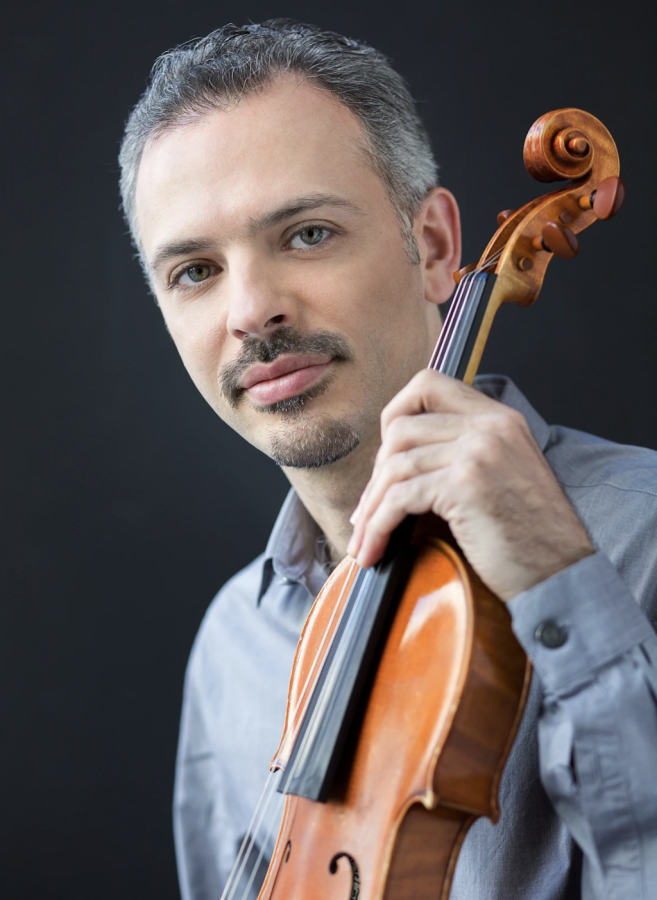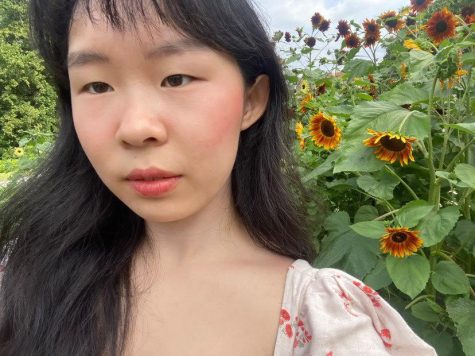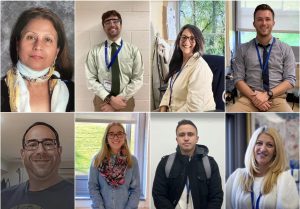Notable Alumni Interview Series #2: Colin Jacobsen
January 24, 2022
Violinist and composer Colin Jacobsen (Class of ‘96) is a founding member of two ensembles: the string quartet Brooklyn Rider and orchestra The Knights. He is also a touring member of Yo-Yo Ma’s Silk Road ensemble. Jacobsen was recently selected to receive a United States Artists Fellowship.
Sophia Liu: How was your time at Great Neck South High School? When did you attend? What was your most memorable experience?
Colin Jacobsen: I graduated in 1996, but I didn’t get to go to graduation. I went to The Juilliard School a year earlier, so that was my senior year of high school and first year of college. But I had a great time at Great Neck South with a great set of friends, even though I was leaving school to go play concerts.
There was an environment where everyone was doing their own thing more. Whereas in middle school, you feel that it’s harder to be allowed by your peers to differentiate yourself. I felt like an alien weirdo playing the violin in middle school, but in high school, people became more independent. And I was that guy who played the violin.
SL: Was there a teacher that particularly influenced you?
CJ: There was my physics teacher, Lewis Love, who also loved music, which was a nice overlap. He was so enthusiastic about physics that it was infectious. I think that’s what a great teacher can do—if they love something so much, you can’t help but be swept away by their enthusiasm.
But there wasn’t really a music teacher at South that influenced me. I didn’t play in the orchestra because I had my school day arranged with all my major classes lined up, and then I went home to practice. I didn’t stick around for the school orchestra, unfortunately, which would have been fun. I was mostly going to Juilliard pre-college at that time and I played in their orchestra.
SL: How did that work out—leaving school early to practice?
CJ: My parents and I asked the administration if there was a way to line up my classes so that I would do everything one is supposed to do but be able to go home early to practice. Luckily, that was possible.
I did not do Physical Education at school but I did tennis three or four times a week and that was given credit for PE.
There’s always an upside and downside to everything: I think that it was great that I was able to go home and practice, but I missed out on being in school and all the social activities. I couldn’t do any clubs or sports. I would definitely love to have been on the tennis or baseball team at school.
But that was the path I was on, and the path that my parents were helping me with.
SL: Did you feel like you still had full high school experience despite having to carve out so much time out to practice?
CJ: Yeah, but definitely not as full as others. Extracurriculars are some of the most intimate interactions with your peers, and I did miss that. In a way, I had two groups of friends: my school friends at South and then my musician friends. There was a fair amount of socialization going on nevertheless.
SL: How did you balance studying with practicing?
CJ: To this day, I would describe myself as somewhat of a procrastinator, whether it’s writing a piece of music or a paper. There’s a pressure at the back of my head of, Oh, I have to get that paper in, because there’s a deadline. Without the pressure of the deadline, I find it hard to write a piece of music. I remember there was always a lot of struggle to get everything done. I feel like I often turned in good work late. A lot of times I would do work on the road. I would be playing a concert somewhere and then on the plane, I’d be doing my schoolwork.
I have been continually trying to learn the lesson to get started earlier.
SL: Were your teachers understanding?
CJ: Some more than others. But I always did the work. It just sometimes came in a few days late, because of what was going on.
SL: Your musical talents have been praised from a very young age—a New York Times article calls you a “prodigy en route to virtuoso.” Did this create any pressure for you growing up?
CJ: I was very lucky to have the parents I did, who were musicians. They knew what it takes to become a very good musician. And yet, they were not crazy stage parents who pushed me excessively. They really did want me to have as normal of a childhood as possible, while acknowledging that it takes many hours of practice a day to do what I ended up doing.
It’s always a matter of balance. My parents helped me organize the day well, so that depending on what part of my schooling I was in, I had time to practice.
In elementary school at Lakeville, school didn’t start until 9:20, so I was always able to practice an hour before school, and then come home and practice another hour. I would do two hours of practice. That still left plenty of time to go out and play with my friends with what little homework one has in elementary school.
Obviously, that got harder in high school because it starts at 8 am and there wasn’t time to practice before, unless you were a crazy early riser, which I was not. My parents really helped me organize my time efficiently so that I could still play tennis and baseball with my friends even if I was practicing three to four hours a day.
SL: How did you feel about being called a prodigy?
CJ: I will say I enjoyed the attention that one gets for being good at doing something that not a lot of other people were doing. I needed to listen to what the world was saying and tune it out at the same time in order to feel too much pressure and to not get a big head. Once again, my parents were really good at making sure that I didn’t feel too much pressure or inflate my ego because people were calling me something. They were very grounded.
SL: Would you consider that word fitting?
CJ: Here’s the thing: music is a universal language in that everyone can learn it and participate in it to whatever degree. I think that anyone can, if they put in a lot of time in, become quite proficient at it. I also think there is an added element, and I’d say I did have a certain amount of hearing or physical ability that helped. I also had a good teacher.
I think that Mozart and Mendelsohn were prodigies, and they were writing music that was quite deep at thirteen years old. I didn’t do that. But I was good at it at an early age.
You’re a big fish in a small pond until you meet lots of other fish. At Juilliard pre-college, there were a hundred other kids who were also really good at a very early age. What’s more interesting to me is in the long-term: what do you do from that age where you are proficient already? And then how do you make a life in music out of that? And what does that look like?
SL: How did coming from a musical family nurture your abilities?
CJ: The earliest memories I have of music are my parents playing music in our living room, not to rehearse for a concert, but just for fun. They would get their friends, outside of their regular jobs of teaching music, playing in the Metropolitan Opera, etc, to just get together and jam until the middle of the night. I would be allowed to stay up as a three-year-old to listen and I felt a very warm social aspect from music. That’s what helped make music passion-driven learning for me because I saw that practice was the ability to have fun with other people playing rather than just this solitary, difficult thing.
SL: Do you think you would have still found music if it wasn’t for your upbringing?
CJ: That’s one of those questions impossible to know. I can’t imagine life without music. So I would say yes, but it’s hard to know.
SL: Was music always a very clear career path? Did you ever have any doubt?
CJ: I remember always wanting to do it. At earlier ages, I thought I could be a musician as well as a tennis or baseball player. But at some point, you realize that becoming a tennis player takes as much rigor and dedication as being a violinist and you can’t do all those things. But you can do them all to a certain level. To this day, I play tennis.
But there were other things as I grew older, like journalism, that interested me. Still, all of those things were fleeting ideas—music was always my North Star. I think that what has changed is the definition of what I thought I would be doing in music.
SL: Can you talk more about that change?
CJ: My dad, who grew up as a classical violinist, had limited options. He could either play in an orchestra or be one of the few soloists that go around playing concertos with orchestras. I was on that concerto path, but I loved playing chamber music—playing in small groups three, four, five—where you’re working as a team, but have your solo voice in the mix. That’s the setting I first heard music in our living room, with my parents playing chamber music with their friends.
I got a call to be a part of the Silk Road Project at Tanglewood in the summer of 2000, which was a project started by the cellist Yo-Yo Ma to bring together musicians from the western tradition with musicians from all over the former Silk Road trading route, from China to Turkey, and to have composers write pieces that would bring together those different cultures.
I didn’t know what to expect. I was right out of school, and at that moment I felt the most open to learning—like a sponge. I had been looking for inspiration outside of myself and outside of the western classical tradition. Out of that project, a touring ensemble developed and is still together 20 years later.
In college I was so focused on the violin that I wasn’t writing music. Silk Road reignited my creativity because I was introduced to so many new things and I felt like I needed to absorb them all.
If you go back to Mozart or Beethoven’s time, everyone in their orchestras were writing music, as well as playing it. Even if we don’t play most of their writing today because frankly, it’s not as good as Mozart’s or Beethoven’s, writing fosters an ecosystem of creativity.
With Silk Road, I had on-the-job training with one of the greatest musicians of our time. I felt like I was playing with Roger Federer right out of school. Yo-Yo was really influential to many of us in the ensemble, telling us to do our own thing and giving us advice.
Around that time, I started a quartet called Brooklyn Rider, and all of us also played in Silk Road. We wanted to take the string quartet, which is a very old classical form, and see what we could do to bring it into the present. My brother, who was the cellist of Brooklyn Rider, became a conductor and we started this group called the Knights, which is a chamber orchestra that’s based in Brooklyn as well.
Both of those groups have flourished and are still going to this day. Originally, I thought I’d be mostly playing concertos with different orchestras, which still happens but forms a much smaller part of my life than I thought. I’d say 45% of my life is spent in the string quartet Brooklyn Rider, 45% in the Knights, and then 10% in Silk Roads and doing solo things or other random stuff. I feel very lucky that those groups we started are sustainable and hopefully having an impact.
SL: For Silk Road, was there an audition process to get in?
CJ: No, it was just Yo-Yo asking people he trusted to recommend musicians.
SL: Can you talk more about the Knights and Brooklyn Rider? How does working in each ensemble differ?
CJ: A string quartet is like your nuclear family: your siblings and your parents. It’s for strongly-willed individuals who have come together magnetically because of our interest in music, our taste in its sound, and what music we want to play.
The hard work is getting a meeting of minds and a blending of sound so you speak as one. It’s an intimate and very portable thing. It’s pretty simple to show up with your music stands and instruments and play.
We’ve tried very much, both with Brooklyn Rider and the Knights, to meaningfully play the music that we love from the tradition: Beethoven, Mozart, Schubert, Debussy, etc. but also play music of our time and find interesting ways to blend them. A good parallel would be if you go to an art exhibit and see Monet paintings placed at the end of a time spectrum, or by themselves, or with other French artists from that time. That’s one way you could see an exhibit, but I’ve also seen other amazing exhibits where Monet is positioned at the beginning alongside all of the artists in the future that he influenced. In a way, programming is like an act of curation
Brooklyn Rider has been around since roughly 2006. The Knights have been around roughly since 2000. My brother and I were a part of starting both groups. Eric, my brother, eventually left Brooklyn Rider to follow his conducting paths, and that’s the one member change we’ve had.
Going back to that idea of force-willed individuals, Peter Sellars, an opera and theatre director who we met with, said that a quartet is an emblem of radical democracy because you have four voices that have to be strong in themselves, and then find a way to make your voice work with these three other people. Even historically, that has some merit because at the time of Beethoven was the French and American Revolution. Music at that time was trying to embody some of those democratic ideals. Before Beethoven’s time, you see more of this top-down structure, where one melody is featured and everything else is accompaniment. But with Beethoven, all the voices become really equal partners.
The Knights started because we had this group of friends and we were doing what our parents did: having parties first at our house in Great Neck and then eventually the city when we moved there. We would invite friends over and play music all night for many nights. Out of that group of people, there was a core group that, when we had the opportunity to, put on concerts.
The bonds of friendship and the desire to do this more happened. We didn’t set out to start a new orchestra, but at some point, my brother and I realized we had something special here. And if we’re going to keep doing it, we need to have an organization to support it. We formed a nonprofit to support the work of the Knights. Now, the Knights has a staff of three full-time employees and a board that supports the work. But fundraising is always hard. We’re lucky to have a residency at 92nd Street Y this year and continue to tour.
SL: Your brother played a role in both the Knights and Brooklyn Rider. Is it different working with family than with other colleagues or collaborators?
CJ: It is. People always ask: how do you do it? Do you ever fight? And yes, we do fight. When we do, it’s hard for other people around us because we have an underlying brotherhood that allows us to be direct with each other and then be okay. But we wouldn’t talk to other people that way. We learn so much and we’re so different from one another.
I would describe Eric as more dramatic, theatrical, and efficient. I take longer to make up my mind. We definitely complement each other. On the other hand, part of the sustainability of the Knights is the family core that extends outward.
SL: I think it’s so cool how you’ve taken your music all around the world in both performance and practice. How does each fellowship or residency build upon previous experiences? How does the environment you’re in affect your work?
CJ: With Brooklyn Rider, we went many years to UNC Chapel Hill and would do three concerts a year and visit classes, not just music classes, to tie in the work we did to a wider universe of student life.
Brooklyn Rider was named after the Blue Rider group that was active in Munich right before WWI. We would visit history classes teaching WWI and tie our music with what they were learning about, which colored their lessons in an interesting way. When we have the opportunity to go back to a place, it really enriches the experience.
Often we are on the road where we just hop into a community, play a concert, then go somewhere else the next day, which is also exciting to meet new people. In terms of how it affects us, one thing Yo-Yo taught me early on was that you have your instrument, but the room you’re playing in and the people you play for are your second instrument. How you listen to the space you’re in and the feedback you get from it changes how you play in subtle, but important ways.
When we go into a storied, old concert hall in Europe, you feel like you’re on the stage where Brahms or Beethoven once were and that’s an incredible feeling. Also, we’ve taken music to unexpected places when you don’t think a music quartet is going to show up, such as a club in the Lower East Side and Tōdai-ji Temple in Nara Japan, where we played in front of the world’s largest Buddha statue.
Ultimately, every time you go out and play, there’s the possibility for magic and that’s the work of preparation: you’re a storyteller and should know what you want to say so deeply that in the moment you can improvise based on the timing and the room and the people who are in it.
SL: A lot of your work takes from non-western traditions. How did this interest begin?
CJ: It was a girlfriend at Juilliard. I had tunnel vision of playing the western tradition and she was a very open-minded person: well-read, wrote poetry, was interested in flamenco music, and introduced me to pop music. My house was a classical music fortress, with my dad telling me who was good or not. From that very cloistered environment, she opened my eyes up to a wider world.
Then there was Silk Road and meeting Iranian musician Kayhan Kalhor, who plays the Persian equivalent of the violin, called kamancheh. I had been trying to sound like the human voice for years and the way he played it sounded so much like it. The ornamentation and the atmosphere was so beautiful and I was taken.
I ended up going to Iran and studying with him for ten days in the summer of 2005, which was crazy at the time. What was beautiful about the Silk Road Project was that it bridged cultures that politically may not be getting along and found connections between them. To this day, we still play with Kayhan, who has written pieces for us and I’ve written pieces for him. Kayhan was sort of a guru figure in my life. There was also an amazing pipa player from China who we’ve worked with outside the Silk Road with the Knights and Brooklyn Rider.
I’ve been very fortunate to be in a creative cauldron of so many different musicians, sounds and cultures. I’ve had such an incredible learning process.
SL: What do you take away from each place you’ve visited? Do you have a most notable memory?
CJ: So many. I’ll start with Isfahan, Iran. There’s the mosque of Isfahan with blue and white all around it and it’s beautiful. There’s a spot in the middle where if you clap your hands, it echos exactly seven times. The architects built it that way. The idea of ornamentation and crazy devotion to something was present in all these arts—the rug-weaving, the ceramics, the music. I love finding the connection between all those arts.
We played at the Red Fort in Delhi. We also played in Cairo, Egypt for the dedication of a new park built at the center of the city. It was sunset and we were working with a singer from Azerbaijan. We were right near the City of the Dead, a cemetery. Right when we started, the mosques called for prayer so these eerie, incredible voices called at once and I had goosebumps.
SL: How did the pandemic affect your work, given that you couldn’t travel the world or play in front of live audiences?
CJ: Obviously, there were a lot of horrible things but the silver lining for me was spending time with my family. I have a wife and six-year-old daughter. Usually, I’m traveling half of the year and can only see them for the other half. I had this incredible, uninterrupted time being with my daughter for the past 18 months.
There were a bunch of weird projects that developed digitally that were really fun and wouldn’t have developed otherwise. Writing and arranging music was something I did a fair amount of. I arranged for Peter Gabriel, Roger Waters, and Cat Stevens—old rockers.
In a way, I had been dreaming of a sabbatical year of not running around the world. My family spent six months of quarantine in Brooklyn, sharing a house with my brother and his wife and daughter. The parents would share childcare duties. Eventually, they went to Orlando where my brother is a music director and we went to San Diego with my in-laws for six months, a good place to be in the winter.
In June, audiences started to come again and we were busier than we’ve ever been in the summer.
The existential question is will audiences come back. Our touring experience this fall is that audiences are still hesitant. I know organizations have received relief money from the government. But eventually, audiences need to come back, or we’re all in trouble.
SL: You do quite a lot of interdisciplinary art such as Ascending Bird with sand artist Kseniya Simonova and Chalk and Soot, a dance piece that was based on a book of poems by Wassily Kandinsky. How do these collaborations develop and how has the intersection of the arts inspired you?
CJ: When Brooklyn Rider was formed and we were based in Brooklyn, there was a feeling of a bubbly artistic community. Many of our friends were dancers or visual artists and we wanted to find a way to create art together. In your artistic circles, you meet people who tell you to work with this person or this person and you gravitate after conversations to certain projects or people.
Certain collaborations happen when we have an “artistic crush” on someone. That person does amazing work and even if we don’t know them, we know of someone who knows them, so we’ll reach out. Or sometimes people reach out to us.
As a composer, I love writing for dance because it’s so interesting how you may conceive of a gesture in music and how a choreographer interprets that into human movement. Often, it’s not what I expect.
SL: When I was reading about you and your ensembles, I felt that you were constantly performing, or traveling, or making and putting out music. Is there anything you do outside of music just to relax and take care of yourself?
CJ: I do yoga, which is certainly good for an overly stressed violin body. Most of the time I’m not traveling or playing music, I’m hanging out with my daughter, which includes endless activities like playing hide and seek and reading her books.
SL: What advice would you give to high school students, young musicians, or anyone in the process of figuring out themselves and their future?
CJ: Be a sponge. Now’s the time to make learning your own as much as possible, instead of being a repository for what teachers are saying or memorizing dates and facts. What interests you about whatever you have to learn and then can you follow a thread and make it your own? You feel like you’re busy in high school—and you are—but later in life, you have additional responsibilities such as paying the bills and family and that aspect of free thinking and learning about the world is harder to do. Now is such a precious time. Find the people that are interested in what you’re interested in so that you have companions in learning. Learn to be a good colleague and a good team player, regardless of what field you go into.
SL: Lastly, what are you working on now? What can we expect in the future?
CJ: I’m writing a new piece for Brooklyn Rider and mandolin player Avi Avital. We’re going to play that in the spring at 92nd Street Y.
The continual work of the Knights is making our community grow and finding different programs. We’re working on The Four Elements, based on the four classical elements of earth, air, fire, and water. Those are things music has dealt with since classical Greek thought. We’re in a time of rapid environmental change and want to explore what music can do to discuss that. We have four pieces of existing classical music that we have assigned each element. We’ve commissioned four composers to write new pieces on each theme, such as looking at fire in relation to the recent forest fires.
In general, my work is to keep practicing, writing, and pushing these groups forward by finding new collaborators and new places to play in.








